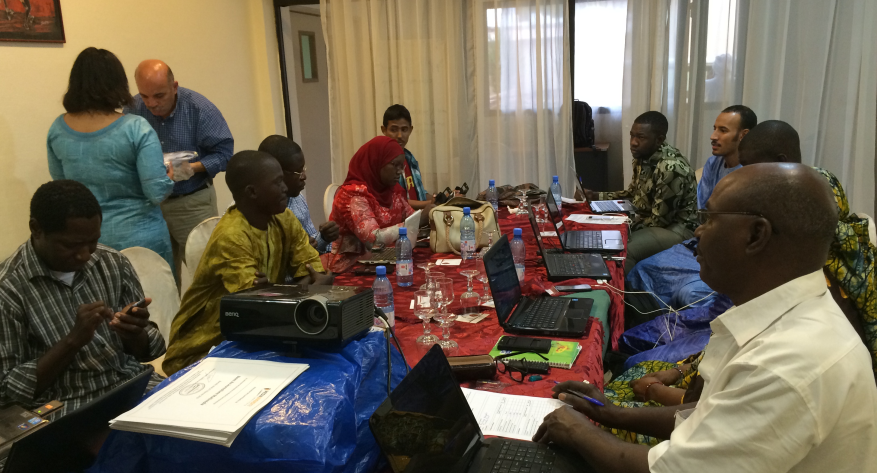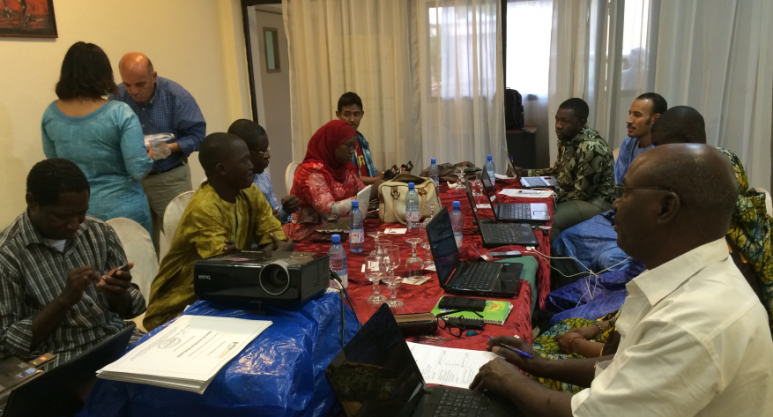Dates: 17 – 23 January 2015
Country: Mali
 Three days, 1542 kilometres and dozens of road blocks: to reach their destination in Bamako, future Dune Voices reporters Mohamed, Souleymane, Abdahrahmane, and Hama had to go through a difficult journey.
Three days, 1542 kilometres and dozens of road blocks: to reach their destination in Bamako, future Dune Voices reporters Mohamed, Souleymane, Abdahrahmane, and Hama had to go through a difficult journey.

As they were travelling south of the rebel-controlled town of Kidal, they saw a group of heavily armed four-wheel-drive pickups hiding under the trees. A few days later, Tuareg forces got involved in a clash with the pro-government militias and pushed the UN mission from Kidal airport. To go back home, the journalists will have to wait for the next UN flight, once the service starts again.
On a different route, Moulaye, AlHousseyni, and their young driver had a long journey. They drove for two and a half days across sand dunes, rivers, and towns, allowing some time for tea breaks, sipping the foamy strong and sugary Saharan tea.
After a long strenuous drive, the 12 Media Diversity Institute’s trainees all arrived in Bamako, where the Dune Voices training session was held on from 17 until 23 January. They came from all around Mali – Aguelhok, Tessalit, Kidal, Gao, Timbuktu, Kayes, and Bamako – to improve their multimedia journalism skills.
The training was organised as part of the preparations for the MDI online platform for Sahara, www.dunevoices.info.
Dune Voices’ correspondents learnt to use several writing techniques, radio journalism tools, as well as video reporting and editing. “We received everything we needed to work best in our field reporting, and this includes both journalistic technics and working tools”, said Moulaye Sayah.
Journalists were equipped with smartphones, video editing software, and computers (for those who needed one). Ami Idrissa, childcare worker and director of Kouima FM, a youth community radio in Gao, said: “This is my first computer. At our radio station we only have one old desktop that we use for broadcasting only. Now I can practice what I learnt in my computer classes two years ago.”
Ami, 46 years old, also received her first smartphone and opened her first email account. Within hours, she was confidently typing, editing sound and pictures on her handset. Ami is an asset to the team, open to comments and keen to learn. With the advice of the project Director Dominique Thierry, she produced a brilliant story on transitional justice.
Moulaye, 51, is the eldest of the team but feels young at heart. After working side to side with the MDI trainer Laurent Prieur, Moulaye said: “We always have something to learn, and that what keeps us young”, said the Dune Voices correspondent in Timbuktu, during one of his vital tea breaks.
Moulaye is a professional journalist from Timbuktu. After reporting for many local and foreign media outlets for years, he is now working for the state-owned daily L’essor. Moulaye was one of the few reporters to cover the Islamists’ conquest of Timbuktu, including harassing questioning from the so-called Islamist police during their rule of Timbuktu.
The mix of professional journalists and citizen reporters is the trade mark of Dune Voices agency team. For a few, like Abdarahmane – a youth worker – it was a first approach to the world of professional journalism. “During the training, I learnt how to be neutral when dealing with information we care about”, said Abdarahmane, who will be reporting from Aguelhok, a remote outpost in Kidal region.
Training the journalists gives Dune Voices the possibility to have access to unstable – and underreported – regions in Mali. Baba Ahmed, Mali Country editor, said: “The people in the desert had no access to media; and media did not report their lives, expectations, problems, and wishes. These people are the key targets of MDI’s Inclusive Voices project. We want to give them a voice and include them in the public debate.”
The team is ready to start and the website will be launched soon. “We have now a strong team” said Mourad Sellami, Dune Voices regional editor-in-chief, “and with one or two more recruits expected to join from Segou and Mopti, we’ll be fully prepared to report on the daily lives of these populations.”
The training session in Mali, as the ones previously held in Mauritania and Morocco, was a part of MDI project “Inclusive Voices for Conflict Prevention and Democracy Building in North Africa: bringing the voices of the Sahara into the public sphere”. The challenge of this MDI programme is to gather and train multinational, multi-ethnic and multilingual national teams in Mauritania, Mali, Algeria, Morocco and Libya and give a voice to the populations of the Sahara.
